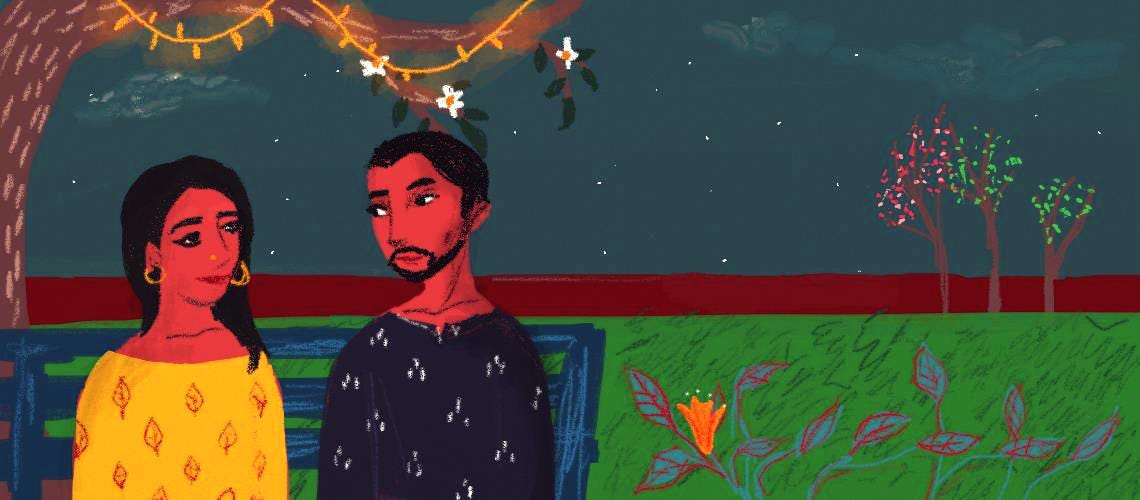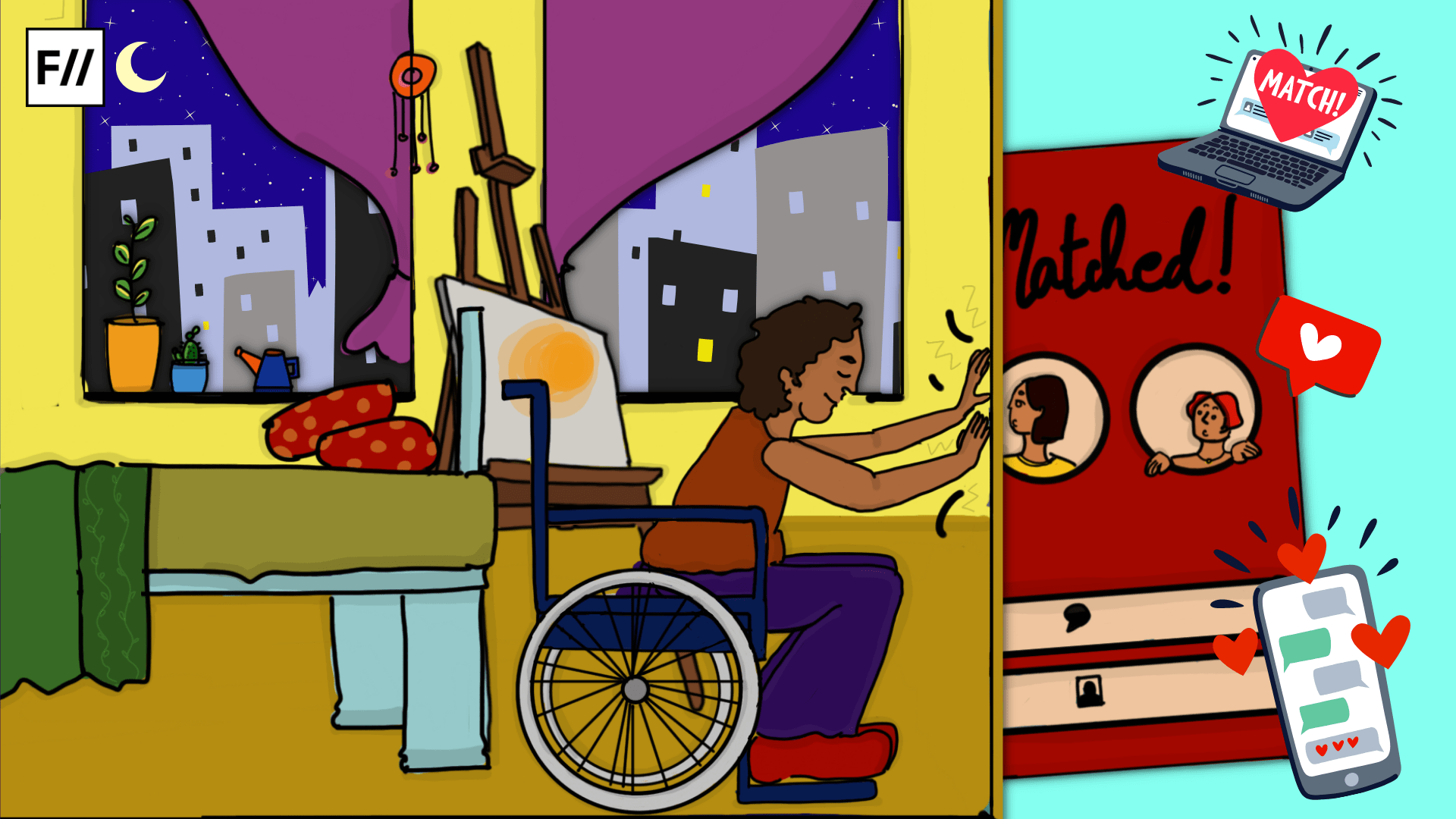Editor’s Note: FII’s #MoodOfTheMonth for February, 2022 is Redefining Love. We invite submissions on the many layers of love, throughout the month. If you’d like to contribute, kindly email your articles to sukanya@feminisminindia.com. This article is part of Cripplentine’s Day, a project by Revival Disability Magazine in collaboration with Feminism In India rooted in the belief that all kinds of love should be celebrated because love is a disabled and queer revolution. An accessible Valentine’s Day should be one that not only includes an able-bodied kind of love between two heteronormative lovers. As a part of the project, Revival Disability Magazine publishes a series of articles on the theme. The theme of Cripplentines Day this year is on what disabled women, trans and no binary folx think about pleasure and how has it changed during the pandemic – how have they coped, in a sense with loneliness and isolation.
Posted by Nu
As single disabled young adults navigating (or trying to navigate) dating during a pandemic, there is so much despair and frustration. Yes, there are plenty of fish in the sea, but most of the fish are ableist and would rather not wear a mask because “the omicron wave is mild, ya“. And yet, we see it everywhere: pictures, tweets, posts of able-bodied couples going on trips together.
Amidst all of this, I cannot help but feel a tinge (or maybe try a truckload) of access jealousy. Despite, I had to adjust my intimacy needs to my ability in the context of a pandemic.
With such despair and the threat of loneliness and dying alone (I should apologise to my vibrator, because she may be excellent at making me orgasm every single time, but she still won’t hold my hand and call my name in an endearing way) looming over our heads, how exactly do disabled folx growing up in their 20s during a pandemic give ourselves the space and agency to dream of love while we live amidst a situation clearly not designed for our ability?

I spend most of my days either in bed, or on my sofa, watching movies and living in other’s stories. I’ve been in love once in my life. But when have I really, truly felt safe and intimate in my relationships? When have I been so comfortable to give love without extreme anxiety and doubt of ever receiving it back?
How do we re-assess physical love, care and touch from a person present in real life, to community love, care and touch present in an online life? How do we engage in disability affirmative intimate language on dating apps? Well, don’t ask me, I’m just as clueless as you are!
Disabled intimacy during a pandemic is so paradoxical, and yet ever so present. I call up my ex and we have a car parked conversation at 4am, except we aren’t together in a car, we’re on a phone call. Sometimes I pleasure myself and think of no one in particular. I’m still learning how to be perfectly single, but what is perfectly single anyway?
As I dance around my room and dream of finding love in a new city, I look at the buildings far away. I’ve been told that I lay all my cards out on the table all too often. I imagine a table overflowing with cards. I’ve been told that my honesty and directness in relationships is often frowned upon – that I shouldn’t give my everything during “the talking stage“. Maybe it’s me, maybe it’s just my neurodivergence. Who knows?
Also read: The Loves Of My Wildest Dreams: Valentine’s Day Plans And Beyond

I tend to mask my authentic disabled queer identity on dates. Sometimes when I get very tired, I drool. Sometimes I pee my pants (just a little) when my crippled legs can’t take me all the way to the bathroom. Sometimes I wish for solitude all my life because I don’t know how to share the bed. I’ve been sleeping alone for 23 years.
Disabled intimacy during a pandemic is so paradoxical, and yet ever so present. I call up my ex and we have a car parked conversation at 4am, except we aren’t together in a car, we’re on a phone call. Sometimes I pleasure myself and think of no one in particular. I’m still learning how to be perfectly single, but what is perfectly single anyway?
Most of all, I’m in a dilemma. I’m in isolation and away from an able-bodied, ableist world. Maybe I’m getting used to this isolation, this comfort, this bed, the absence of eyes looking down at my giant monstrous shoes and scowling at me. Maybe, just maybe, I can stay indoors for the rest of my life until a giant asteroid destroys Earth and all of us, along with it. Maybe I’m not meant to find the love of my life because maybe I’m the love of my own life
My disabled fingers get fueled by my singlehood and create imperfect, chaotic art. I write countless narratives of loneliness and peace. I don’t feel like going on dating apps nowadays, I’d rather be alive for my work, my friends, and my colouring book.
As I wash my vibrator in warm water, I wonder – is this the extent of intimacy that I’ll get in this lifetime? What about all those great love stories that I see on television as I eat my 8th cup of ice cream? Will I ever fondly remember my relationships with other people, or will they just be memories of abuse, despair and disappointment?

Most of all, I’m in a dilemma. I’m in isolation and away from an able-bodied, ableist world. Maybe I’m getting used to this isolation, this comfort, this bed, the absence of eyes looking down at my giant monstrous shoes and scowling at me. Maybe, just maybe, I can stay indoors for the rest of my life until a giant asteroid destroys Earth and all of us, along with it. Maybe I’m not meant to find the love of my life because maybe I’m the love of my own life.
As I water my plants and talk to the next cute stranger online, I reprimand myself not to get too attached. I have learned that I’m the center of my own universe, while others just revolve around it. This fact truly does help me sleep at night.
Also read: People-pleasing As A Survival Tool For A Disabled Woman Navigating Intimacy
Nu (They/Them) identifies as a non-binary, disabled, queer person and is a Gender Studies Masters Student at TISS, Mumbai. They are a disability justice author, community organizer and occassional bad bitch. They are the founder of Revival Disability Magazine and Collective, a community for and by disabled and queer folks in India. They firmly believe that Intersectionality gives disabled folks the emotional skin to survive in the world and that vulnerability should be celebrated. According to them, the revolution would be incomplete without disabled joy and dissent
Featured Image Illustration: Ritika Banerjee for Feminism In India
About the author(s)
Revival Disability Magazine is a digital media project on Disability, Sexuality and Intersectional Ableism for disabled and queer folks, by disabled and queer folks. Revival is a revolution of the disabled self to re-claim and re-define stories of disability in India, through first person narratives of lived experiences and creating an accessible queer utopia echoing the vision of for inclusion and accessibility.




